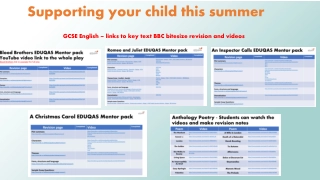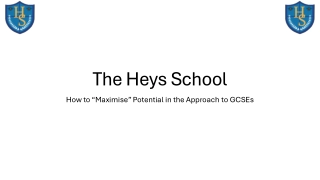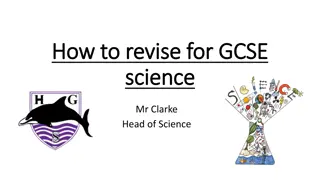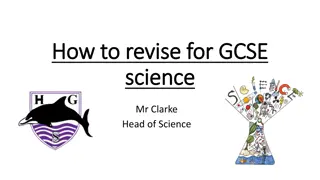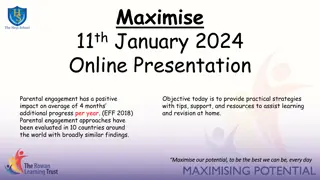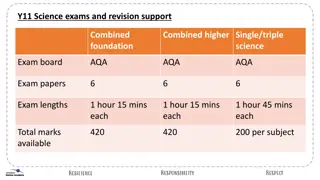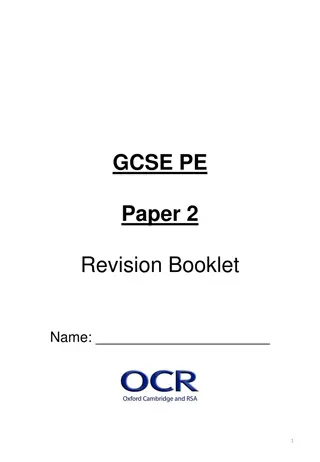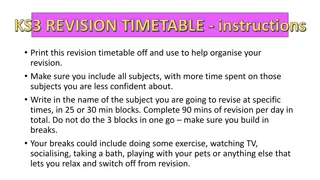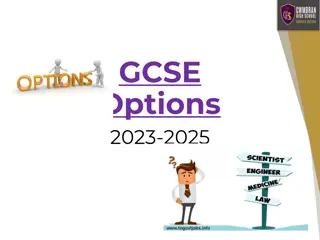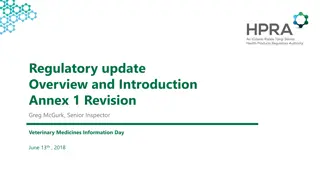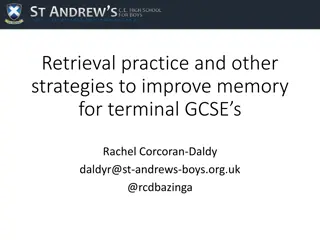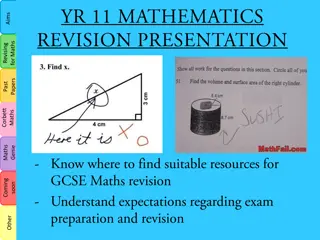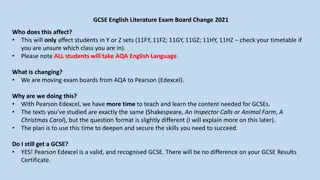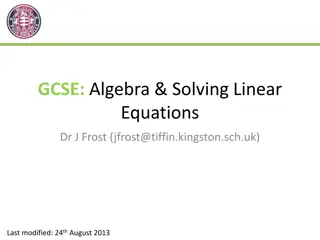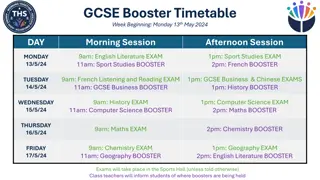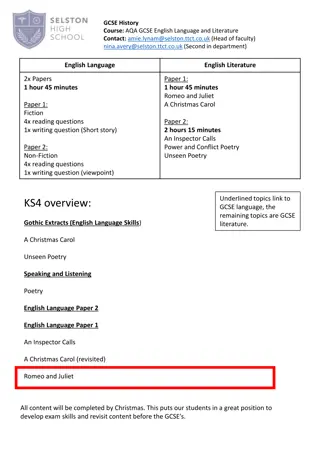Helpful Tips for GCSE Revision
The provided information offers valuable advice on effective GCSE revision strategies, including the importance of spaced learning, seeking guidance from teachers, creating a realistic revision plan, and maintaining focus during study sessions. It emphasizes the significance of regular review and active participation in lessons to maximize retention of information.
Download Presentation

Please find below an Image/Link to download the presentation.
The content on the website is provided AS IS for your information and personal use only. It may not be sold, licensed, or shared on other websites without obtaining consent from the author.If you encounter any issues during the download, it is possible that the publisher has removed the file from their server.
You are allowed to download the files provided on this website for personal or commercial use, subject to the condition that they are used lawfully. All files are the property of their respective owners.
The content on the website is provided AS IS for your information and personal use only. It may not be sold, licensed, or shared on other websites without obtaining consent from the author.
E N D
Presentation Transcript
How hard can they be? GCSES
1. Paperclip 2. Cake 3. Butterfly 4. Car 5. Mr Leeming 6. Cup 7. Banana 8. Octopus 9. Key 10. Tennis ball
What do you want?
REVISION A BIT ABOUT SPACED LEARNING You will forget at least some of what you learned if you do not review it. Reviewing something around three times, with gaps between the reviews, will dramatically reduce your chance of forgetting it. You can do this yourself with your resources or use an app lots available (Tiny Cards is one of them and Memrise / Quizlet Learn work in a similar way)
ADVICE FROM YOUR TEACHERS Don t be passive in lessons or revision sessions. You can only revise what you know, and may need to prioritise. Ask teachers for advice on this at your level. End each revision session on a high makes you okay about returning to it. Focus on one topic at a time. Practice makes .. permanent.
GETTING STARTED PLAN TILL THE EXAMS Make a revision plan that is realistic. Make allowances for regular commitments. Schedule subjects for certain days to give you a focus you can always be flexible. Make sure you have the right stationery folders, dividers, pens, pencils, highlighters etc. Do you have checklists for your subjects? Get hold of ways to practise past papers, study workbooks. Clear your desk and keep it that way!
Google AQA English language GCSE
GETTING STARTED NOW WHAT? Get a drink and a snack if you need them. Have clear and specific goals for each revision session. Sit down and do the first five minutes it is usually enough to get you into the zone. Work on reducing your notes to a single A4 page for each exam by the night before. Take a break to move and get some fresh air after 45 minutes. If you get distracted by something else you need to do, write it down and do it when you have finished. Don t get it, despite trying as hard as you can? Maybe it doesn t matter talk to your teacher if you are unsure. Consider using an app such as Forest ( 1.99 iPhone, free on Google Play) or Flora (free, with in app purchases) to keep away from your phone.
REVISION WHAT AND WHEN? Revision happens in stages only over time can you effectively revise. By February half term have your Year 10 work made into revision resources. By Easter have your Year 11 work sorted.
THE STAGES OF REVISION PREPARE LEARN APPLY
REVISION MAKING RESOURCES (PREPARE) FIRST make notes. See teachers/friends or research anything you know you need to understand but don t yet. THEN make them into resources that YOU can revise from this IS revision don t skip this bit! FROM THIS POINT: Use spaced learning to revise from them.
REVISION USING CARDS (LEARN) These vary in style Q/A, bullet points, one or double-sided. DO NOT WASTE TIME revising what you know if you knew it easily, put it to the back of the pack if not, visit it again promptly. Great for getting people to test you if they can also read them!
MIND MAPS WHY AND HOW? (PREPARE) Can be fun to make, interesting to look at and support visual memory. How? Use colour, words and pictures, large pieces of paper (landscape). Make lines thick to thin. Don t use a computer for any resources unless you will also be using one in the exam. Stick them somewhere you will look often.
FINAL STAGE APPLY YOUR LEARNING You will get plenty of opportunities to practise exam style questions in lessons and revision sessions. Use past papers and revision workbooks tackle the stuff you find the hardest (at your level) Get to know the mark schemes and command words for each subject.
A BIT ABOUT COMMAND/KEY WORDS These are different for each subject. FIND OUT WHAT THEY ARE AND WHAT THEY MEAN. Examples: Tech/Science/Psychology evaluate BEE justify English analyse Media connotations RS - explain
A BIT ABOUT MARK SCHEMES Know the rough grade boundaries this can help you stay calm. What are the marks given for? FIND OUT! Examples: Languages marks for content/range/accuracy of language Geography 9 mark questions require a conclusion Maths 4 marks 1 for the answer and 3 for the working English 16 marks compare attitudes towards X 4 points, each with a comparison of the two. History 4 marks (about a source) describe and put it in context as well as answer the question.
MAKING THE MOST OF REVISION SESSIONS Make them work for you. Go with specific questions or things you want to find out. Schedule them into your week like you would a regular lesson. Go to some of the earlier ones to get a feel for how many you will need to attend.
IN THE RUN UP TO THE EXAMS Make a timetable of when your exams are. Get enough sleep on a regular basis. Eat well (especially breakfast) Do not try to learn too much new material. Avoid drama
GIVE YOUR BRAIN THE RIGHT CONTEXT Use the same water bottle. Use a pen you love and have spares. Sit in the same position. If you can, practise visualising yourself to your revision place when you are elsewhere. Wear the same perfume/deodorant. Use the same pencil case.
DURING THE EXAMS Keep a good routine. Don t discuss exams before or after. Stay in the moment. Find ways to reduce anxiety if you have it rinsing hands under cold water, box breathing (in for 4, hold for 8, out for 4), focus on senses can all help. Done it? Forget it!
Answer the question!
Focus on what you CAN do.
Beware of making silly mistakes
AFTER THE EXAMS Can be an anti-climax. Plan some nice things to do for when you have finished to avoid spending a month in bed. PLEASE don t entice people out who still have exams to do play fair and plan a nice thing for them when they have finished. Enjoy the break! Results day induces MUCH less anxiety if you know you have done the best job you can.
1. Paperclip 2. Cake 3. Butterfly 4. Car 5. Mr Leeming 6. Cup 7. Banana 8. Octopus 9. Key 10. Tennis ball
ADVICE FROM LAST YEARS PUPILS Start revising as soon as possible. Don t listen to people who say they re not doing any they may say that, but most of them are not telling the truth. Make sure you work extra hard in those subjects you want to continue with, but don t neglect the others. Do everything you can to avoid retakes in English and Maths at college! Don t panic you still have plenty of time to figure out the stuff you don t know. Figure out how best to revise for different subjects it won t be the same for every subject. Find people to revise with a supportive study partner/group can really help.
ADVICE FROM LAST YEARS PUPILS Go to revision classes sometimes a different teacher to your regular teacher can really help. Relax! (But be organised) Ask teachers for help with specific things you don t understand (figure out what they are first!) Don t be afraid to make mistakes. Focus on getting enough rest and getting through those intensive exam weeks. Don t count on the time you have just before an exam it could be that not much goes in.


